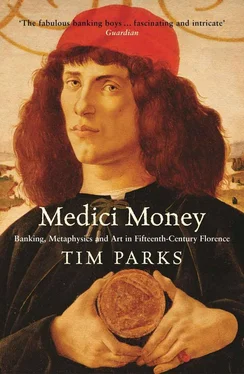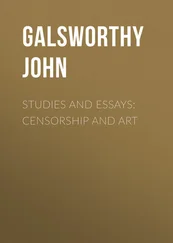In 1410, Cossa was elected pope and became Giovanni XXIII (but not, of course, the Giovanni XXIII of the Second Vatican Council — of which more later). Down in Rome, Ilarione di Lippaccio de’ Bardi, brother of Giovanni di Bicci’s partner Benedetto and now director of the Medici bank’s Rome branch, immediately became Depositary of the Papal Chamber. Which is to say, the Medici bank in Rome now held the pope’s cash, collected his vast incomes, paid out his vast expenditures. They lent him money for war on Naples and they lent him more money to pay the reparations when he lost the war. Indispensable — and friendly too! — the bank began to suggest whom the pope might appoint to this or that bishopric, then collected the fees due when the appointee took up his position. Obviously, the bankers only proposed candidates who were in a position to pay promptly. Throughout Giovanni di Bicci’s life, and much of Cosimo’s, more than 50 percent of the Medici bank’s profits came from Rome.
To invest that holy income (in ambiguous bills of exchange), the bank had already opened two new branches in major trading centers, Naples and Venice. The relationship of these branches to each other and to the central office in Florence was to be crucial. The Bardi and Peruzzi banks that had preceded the Medici collapsed in part because of bad debts to foreign monarchs, but in part also because there was no juridical distinction between its operations in different countries. The bank as a whole was liable for the debts of each of its outlets. If money is allowed to flow without restraint, a sudden movement will tip the boat. Worse, in order to fund such a huge international operation, the Peruzzi in particular had brought a large number of partners into what was a single, monolithic organization, with the result that eventually they lost overall control. When money began to leak drastically from one or another branch and the ship listed, the various partners began to argue. It was hard to steer to a safe haven.
Giovanni di Bicci resolved these difficulties with a simple structural correction, and in doing so revealed at once what was to be the genius of the Medici family: its manipulation of people within organizational structures — first financial, but later social and political too. Each branch was to be a separate company. The shareholders were: the branch director, to the tune of something between 10 and 40 percent, and then the Medici bank for the rest. Not the Medici family personally, and not the Florence branch, which had the same status as the other branches, but rather a separate holding company located in a separate office in Florence. In this way, a large number of capital-bearing partners could be brought in — one or two in each branch and one or two more important figures in the holding — without the Medici themselves ever losing control of either the parts or the whole.
A branch director would receive expenses and a considerably larger percentage of the profits than his own share of the investment would appear to warrant. This to motivate him. In return, he was obliged under contract to live in his branch’s city and to observe the rules enforced by the holding company: Don’t lend more than 300 florins to cardinals; to courtiers no more than 200; don’t give credit to any Roman merchant, unreliable; nor to feudal barons, not even if they give you security (barons are a law unto themselves); and never, never lend money to Germans, since their courts won’t respect your claim if, or rather when, things go wrong.
Between cashiers, letter writers, messenger boys, and managers, there were about four to eight people in each branch — all working, eating, and sleeping in the same building, sharing the same one or two servants, slaves, and horses. The holding company in Florence was responsible for all hirings and firings. And salaries. Otherwise, who knows what complicity might arise between a branch director and his staff in a distant city? In addition to the official ledgers, there was also a “secret book” in which the director wrote down such things as the discretionary deposits of clients who wished to remain anonymous. And salaries. No one must know another’s salary. There must be no opportunity for private gripes and local conspiracies against the head office. The secret book was made of parchment, not paper, to last longer, and kept under lock and key, often in the director’s bedroom. Once a year it would be taken to Florence for discussion. Above all, each branch dealt with the others as with any other company. Each was part of a whole, but simultaneously in competition; each running its own show, but under observation. Thus the Medici learned the techniques they would later apply in the political sphere: Divide, be reasonably generous, and rule.
Yet at once it became clear that however sophisticated the structure you formulated, the choice of staff would always be crucial. To make money, you need astute men and honest. And healthy. No sooner had Castellano di Tommaso Frescobaldi been appointed, in 1400, to run things in Naples than he fell sick and died. Good management can do nothing about the plague. Neri di Cipriano of the once-noble Tornaquinci family became the first director in Venice, in 1402, and immediately broke contract by lending money to Germans. Even Poles! He never recovered it. Faking the books, both manifest and secret, he invented a first-year profit and borrowed at 8 percent to have further capital, which he went on losing. Since the Medici did not routinely send inspectors to their various branches, it was three years before the now-considerable reversal of nearly 14,000 florins was discovered. Dealing in money is so exciting because its liquid nature makes the losses as great and as swift as the profits. The medieval wheel of fortune has speeded up. Everything is levered and intensified. Condemned by the Venice courts, Tornaquinci surrendered his belongings and fled to Cracow, where he recovered some of the Medici cash from the Poles but did not return it to the Medici. Eighteen years later, hearing that Tornaquinci had fallen into poverty in Poland, Giovanni di Bicci sent him 36 florins, enough to live on for a year and more. In the end, we know very little about Giovanni, but it’s hard not to warm to someone who could show charity to an employee who had behaved so badly.
AS WELL AS choosing the right manager, one also had to get the right pope. When Giovanni di Bicci became Giovanni XXIII’s banker, there were actually three popes in vitriolic and even bloody conflict with each other: Giovanni in Rome, Benedict in Avignon, Gregory in Naples. In the second story of the Decameron , Boccaccio suggested that it was precisely the perverse antics of the Church, its corruption and interminable internecine quarrels, that demonstrated the resilience of the Christian faith. People went on believing regardless. All the same, three popes presented a serious administrative headache. Who makes the clerical appointments? To whom do I pay tithes? Who will shrive me? Weary of the division, the Holy Roman Emperor invited all contenders to a Church Council in Constance in 1414 to settle the matter. Giovanni XXIII, who was at that point taking refuge from his various enemies in Florence, set off, and with him the Rome branch of the Medici bank. The Rome branch — take this as read from now on — always travels with the pope and his entourage. In the end, for banking purposes, Rome is the Curia, the papal court. What has there ever been in Rome, Italians still complain, but bureaucracy, ecclesiastical or secular?
Everywhere the pope went, food and accommodation prices rose, endearing him to some and half-starving others. And what with three popes and all the cardinals arriving from all over Christendom and moving a great deal of money back and forth, the Italian banks did good business in Constance. Cosimo, now twenty-five, having just married Ilarione’s distant cousin, Contessina de’ Bardi, joined his in-law to get some experience and meet some useful people. Alas, their pope came out the loser. After some tortuous diplomacy, Baldassarre/Giovanni, sensing things were not going his way, tried to scuttle the council, upon which he was arrested and accused of heresy, incest, piracy, simony, sodomy, tyranny, murder, and fornication … with more than two hundred women. Perhaps there is a wild leverage in matters of morality as well as in banking. You are the world’s spiritual leader, or the worst of all villains. You are singing in paradise or utterly damned. In any event, the culprit ceased to be pope, and in fact, so far as the Church was concerned, never had been. Hence the title of Giovanni XXIII was still available for a less-ambiguous candidate five centuries later. Meantime, the Rome branch of the Medici bank split, one half staying with the now-imprisoned Baldassarre/Giovanni and the other attaching itself to the new Pope Martin V, the two other papal pretenders having wisely retired from the field.
Читать дальше












